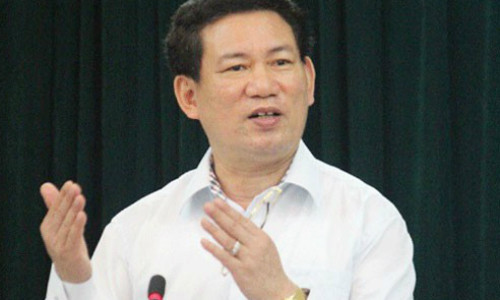Auditor General: Land-for-infrastructure investment is prone to corruption because of 'golden land'
Land value is calculated not close to the market, much lower than when handed over... are the shortcomings of the BT investment mechanism, according to Auditor General Ho Duc Phoc.
TAt the workshop on BT Investment Mechanism - Issues and Solutions, organized by the State Audit on October 19, Mr. Ho Duc Phoc - State Auditor General commented that although it is rarely criticized by public opinion, the BT investment form (investment in exchange of land for infrastructure) is easily distorted and transformed due to lack of publicity and transparency."Investment in the form of BT is creating huge profits from the opportunity to own prime land and prime locations," the State Auditor General commented.
According to Mr. Phuc, most BT projects (investment in exchanging land for infrastructure) are allocated land before the project is completed, the land price at that time is much lower than the land price at the time of project handover, leading to payment not ensuring the principle of parity, benefiting investors, causing damage to the state budget.
 |
State Auditor General Ho Duc Phoc is worried that the distortions in BT project investment have made it a "fertile ground for negativity and corruption". |
Citing the example of the Hanoi Museum investment project, which, when completed, became a symbol of waste of State resources, Dr. Le Huy Trong - Chief Auditor of the State Audit Office V, said that the gap in legal regulations made the BT project, when completed, become "fertile ground for corruption and negativity for investors to profit from".
“We apply an advanced form of management within a legal framework that is not strong enough, with many overlaps and loopholes for investors to manipulate,” added Chief Auditor of the State Audit Office V.
Dr. Pham Quang Tu - expert of Oxfam Vietnam agreed. After building infrastructure projects, the land that was undervalued became "golden land", from the price of agricultural land to urban land, the land value increased dozens, hundreds of times, investors benefited greatly.
“Currently, there are no detailed regulations on construction valuation and quality. The State suffers a double loss in these two points: construction valuation and land price are both not true to reality. Land price is lower than reality while construction price is increased,” Mr. Tu assessed.
Another drawback is that most BT projects are assigned to contractors, reducing competition in selecting investors and potentially posing risks of choosing investors who do not have the capacity to implement the project. For example, in Hanoi, 15 BT projects were inspected, but only 1 project was bid, the rest were assigned to contractors.
Projects are implemented without bidding, the investor is almost "one-man market", which reduces competition and lacks transparency. Land use rights are not determined accurately and completely. Thus, the State as well as the economy suffer double losses.
In a deeper analysis, Dr. Nguyen Dinh Hoa, School of Auditing Training and Development, said that the nature of BT projects is buying and selling activities but not according to market mechanisms. Prices are easily changed in an upward direction due to many non-market factors. When the project is completed, technical and financial audits should be conducted to accurately determine the quality and value, as a basis for "payment" with land funds. However, no BT project has been inspected or audited, only final settlement.
“It is time to say goodbye to the mechanism of 'exchanging land for infrastructure' in well-developed localities. It can only be applied in some underdeveloped localities where local budgets are still weak and infrastructure is still lacking,” Mr. Hoa commented.
Another shortcoming in BT investment, according to Ms. Truong Hai Yen - Deputy Head of the General Department (State Audit), is the increase in the total investment capital of the project. Through the audit, some costs in the total investment are higher than the reality and regulations, lacking basis; leading to an increase in the total investment, appropriating State budget money.
Ms. Yen also said that the signing of BT contracts is still inappropriate, not strict, and lacks sanctions when investors violate progress, project implementation time, construction quality, etc. Specifically, in the case of BT projects that have been paid for by other land allocation projects before completing the BT project, investors are not pressured to implement the project according to the committed schedule.
According to data from audit results, the State Audit has recommended financial handling of more than VND3,815 billion out of a total of VND30,425 billion in 21 projects, equivalent to 12.54% of the audited value.
Faced with gaps that make BT easy to become a piece of land that is being carved up, Professor Dang Hung Vo - former Deputy Minister of Natural Resources and Environment proposed that it is necessary to supplement regulations on technical audit to assess quality, financial audit to assess the value of infrastructure works; on land valuation paid to investors, as well as the responsibility for periodic and unscheduled inspections of Ministries and Provincial People's Committees where BT projects are located.
“There should be detailed regulations on the requirement for cost-benefit analysis between the BT mechanism and the State auctioning public assets to get money for infrastructure construction, as a basis for the decision to implement BT projects. At the same time, it is not allowed to hand over land to pay infrastructure investors before acceptance, completion of quality assessment, and valuation of value...”, Mr. Vo proposed.
| BT projects are implemented through build-transfer contracts, a form of public-private partnership (PPP) investment. In a BT contract, after construction is completed, the investor transfers the project to the state and is given the opportunity to implement other projects to recover the investment capital. BT projects, also known as “land for infrastructure”, have been developing vigorously again in many localities after a period of stagnation. |
According to VNE
| RELATED NEWS |
|---|


